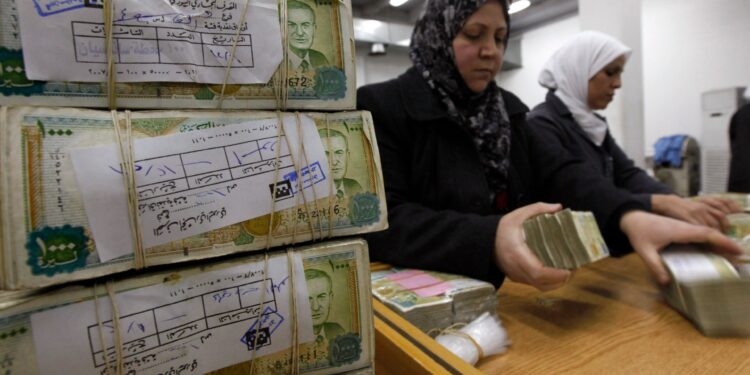1/14/2025–|Last updated: 1/14/202502:56 PM (Mecca time)
The exchange rate of the Syrian pound rose today, Tuesday, against the dollar in parallel market transactions, while it stabilized in Central Bank of Syria transactions.
This comes after a decline in yesterday’s trading in the Syrian governorates in the parallel market.
Parallel market transactions
- The exchange rate of the Syrian pound rose today, Tuesday, against the dollar in Damascus and Aleppo to 11,400 liras against one dollar for purchase from the level of 12,100 liras in the last transactions yesterday, while the selling price increased to 11,700 liras from 12,400 liras to the dollar yesterday.
- In Idlib (northwestern Syria) and Al-Hasakah (northeastern Syria), the exchange rate of the Syrian pound increased today, Tuesday, when buying, to 11,500 liras from the level of 12,200 yesterday, while the selling price declined to 11,700 liras from 12,400 liras to the dollar. .
At the Central Bank, the exchange rate of the Syrian pound stabilized today, Tuesday, at 13,000 for purchase against the dollar, while it recorded 13,130 pounds for sale against the green note (dollar).
Factors affecting the performance of the lira
- Syrian banks and banks refrained from pumping the lira into the markets, and thus merchants and factory owners were forced to sell the dollar in exchange for obtaining the lira from the parallel market to cover their expenses.
- The government is holding on to limited amounts of the Syrian pound to fulfill its commitment to pay a 400% increase in employees’ salaries starting in February 2025, which has increased the government’s demand for the Syrian pound.
- The supply of dollars increases, and the central bank holds on to lira reserves.
- French Foreign Minister Jean-Noel Barrot said last week that European Union sanctions on Syria, which are hampering the delivery of humanitarian aid and the country’s recovery, could be lifted quickly.
-
Six European Union member states called on the bloc to temporarily suspend sanctions imposed on Syria in sectors such as transport, energy and banking, according to Reuters.
-
European Union foreign ministers are scheduled to discuss easing sanctions on Syria during a meeting in Brussels on January 27.
- The Syrian Minister of Trade in the Syrian caretaker government, Maher Khalil Al-Hassan, stated – in an interview with Al Jazeera Net – that customs duties in most of them will witness a decline, perhaps reaching more than 50% or 60% in some of them, stressing that this will reflect directly and positively on Prices of goods in the markets.
- Last week, the US Treasury issued a license to Syria (an exception to the sanctions) allowing transactions with government institutions and some energy transactions, and allowing the transfer of personal funds to Syria, including through the Syrian Central Bank.
- The Governor of the Central Bank of Syria, in charge of conducting business, Maysaa Sabreen, said that the United States of America allowing personal transfers from Syrians abroad was a positive step, calling for the complete lifting of sanctions so that the banking sector can connect to the global financial system.
- Caretaker Finance Minister Muhammad Abazaid told Al Jazeera that the foreign debt ranged between $20 and $23 billion, in addition to “billions of domestic debts.” He added that they had inherited “a dilapidated state with empty coffers and huge debts,” and that the Assad regime had “no records.” You can return to it.”
- Economy Minister Basil Abdel Hanan spoke to Al Jazeera Net, earlier last month, about a plan regarding the lira, saying that the main goal is first to stabilize the exchange rate in order to stabilize the markets and move the wheel of trade exchange.



